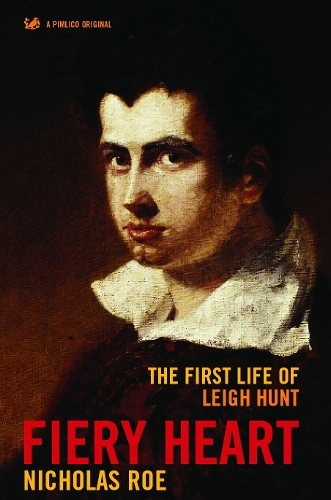
Fiery Heart: The First Life of Leigh Hunt
(Paperback)
Publishing Details
Fiery Heart: The First Life of Leigh Hunt
By (Author) Nicholas Roe
Vintage
Pimlico
20th January 2005
United Kingdom
Classifications
General
Non Fiction
Biography: writers
Cultural studies
828.709
Physical Properties
Paperback
448
Width 153mm, Height 233mm, Spine 33mm
600g
Description
Leigh Hunt (1784-1859) is the lost giant of English culture - the 'spiritual grandfather' of the modern world according to Virginia Woolf. Descended from black Caribbean's, Hunt was a child of the American and French Revolutions, determined to throw off the old order. As a poet and a radical journalist, he was a passionate advocate of liberal causes and was jailed for his daring campaign against establishment corruption embodied by the Prince Regent. A complex and contradictory figure, Hunt enjoyed the role of political martyr and the homage of writers like Lord Byron while battling with psychic vulnerability and private phobias. Hunt's genius discovered poets like Keats, Shelley, and Tennyson, and his own sparklingly controversial poetry advocates the sexual freedom that characterised all his relationships. In the first full biography in over seventy years, Fiery Heart brilliantly captures this fascinating man and his turbulent times.
Reviews
Roe is an exceptionally shrewd critic of Romanticism - uncannily alert... everything he says is well-turned and reliably clever -- Andrew Motion * Guardian *
Roe provides as complete a portrait as we are likely to get of Hunts first 37 years -- Nicholas Shakespeare * Daily Telegraph *
Roe offers a meticulous and thorough account of Hunts significance in the literary culture of the Regency era * Sunday Telegraph *
Roe is a seasoned Romantic scholar who offers an impassioned account of Hunt's 'first life' -- D J Taylor * Sunday Times *
Roe's biography is an absorbing account of English intellectual culture in the early 19th century * Evening Standard *
Author Bio
Nicholas Roe is Professor of English at St Andrews University. He is the author of many books on Romanticism, including Wordsworth and Coleridge: The Radical Years (1990), John Keats and the Culture of Dissent (1998), and The Politics of Nature: William Wordsworth and Some Contemporaries (2002).
